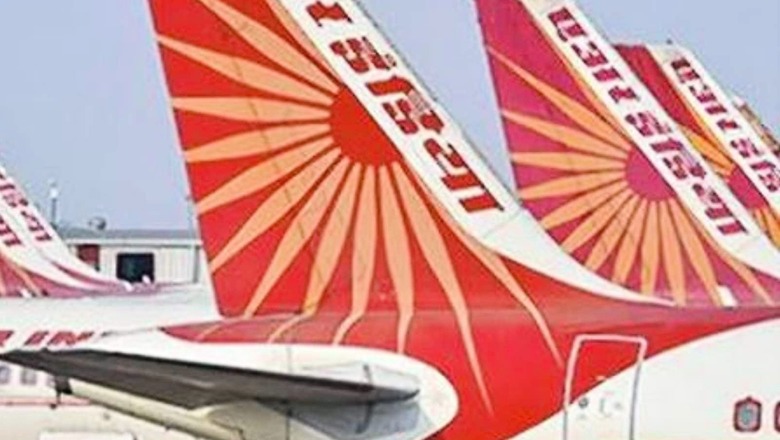
views
Finally, privatisation has restarted. The last time it happened was almost two decades ago, when Atal Bihari Vajpayee was the Prime Minister and Arun Shourie the disinvestment minister. The restart becomes even more significant because the public sector undertaking (PSU) sold is a big one, Air India. The purchase of state-run HPCL by another state-run company, ONGC, three years ago surely didn’t qualify as privatisation.
After decades of efforts by the government (of Vajpayee and Narendra Modi), after zillion twists and turns, the so-called national carrier will be sold to the Tatas. Talace Pvt Ltd, a wholly-owned subsidiary of Tata Sons, will pay Rs 18,000 crore to acquire Air India’s entire equity.
The wheel has turned full circle. Began by JRD Tata in 1932, the airline was nationalised by then Prime Minister Jawaharlal Nehru in 1953. Tata, however, continued to be its chairman till 1977. He was allowed to run it professionally, but political meddling could not be averted for long. It took its toll on the efficiency and finances of the company.
So, today Air India’s total debt is around Rs 61,560 crore. Of this, the Tatas will take over Rs 15,300 crore; the rest will be held by a special purpose vehicle, Air India Asset Holdings Ltd. The SPV will also get Air India’s non-core assets and land, which is substantial.
ALSO READ | Air India: Acquisition is the Easiest Part, Real Work for the Tatas Starts Now
From the government’s and the taxpayer’s perspective, Air India privatisation is good riddance. The journey ahead, however, won’t be easy, for all the enemies of privatisation—and they are a legion—will assail the decision and leave no stone unturned to get it rolled back.
The rhetoric—and it’s always rhetoric, never reasoned and evidence-based argumentation—is quite familiar by now. ‘Selling family silver to pay the grocer’s bill’, ‘handing over national assets to greedy capitalists’, and long is the litany of lamentations.
Of course, they never explain how on earth a sick, tax revenue-guzzling PSU can be called family silver. By what stretch of imagination can an entity bleeding the public exchequer be termed a ‘national asset’? Why Air India is called the ‘national carrier’? Because it has been carrying the nation or because the nation has been carrying it?
An assortment of individuals, interests and groups are determined to check any privatization; these include professional revolutionaries, antediluvian activists, public intellectuals, trade unionists, saffron commissars, Swadeshi fanatics, et al. We should also not forget the deep pink state—that is, generations of policy and decision-makers entrenched in the system, who have imbibed all the dogmas and shibboleths of socialism, for whom any move away from statism is anathema.
When all enemies of privatisation speak, and they do that whenever the occasion arises, the noises they make grow into a crescendo. This is something few politicians and parties are comfortable with. It needs to be mentioned here that even Shourie, the most audacious privatiser to date, could not sell PSUs in the last two years of the Vajpayee government (2002-04).
It is a well-known fact that Prime Minister Narendra Modi has a lot of clout in government and in the saffron parivar, much more than Vajpayee ever enjoyed. This will stand him in good stead in his privatisation endeavours.
Of course, they will raise a stink; they have already been doing it. The Bharatiya Mazdoor Sangh (BMS), the RSS’ trade union wing, has announced it will organize an all-India protest against privatisation, now called the National Monetisation Programme, on November 2. The Swadeshi Jagran Manch, another RSS body, has long been opposed to privatisation and disinvestment.
Hopefully, the Prime Minister will not be subdued by the noises they make.
ALSO READ | Air India Sale: Undoing the Grief Nehru Govt Heaped on Private Enterprises and JRD Tata
There is also a possibility of Air India privatisation getting challenged in court. Balco sale was disputed but the Supreme Court validated the privatisation in 2001. This, however, didn’t stop other opponents of disinvestment from taking other transactions to court. Shourie and others had to face trial in a CBI court for years, despite the fact that the sale was transparent; it was only last year that they got relief from the Rajasthan High Court.
Air India sale has also been clean. An official press release correctly said, “The entire disinvestment process has been carried out in a transparent manner, with due regard to confidentiality of the bidders, through multi-layered decision making involving Inter-Ministerial Group (IMG), Core Group of Secretaries on Disinvestment (CGD) and the empowered Air India Specific Alternative Mechanism (AISAM) at the apex ministerial level. Transaction Adviser, Legal Adviser, Asset Valuer, professionals in their respective fields, have supported the entire process.”
However, a petition against Air India privatisation can still be filed in a court. The government must not just stick to its decision but also continue the disinvestment process, which has started after such a long time. By reducing burden on the exchequer, privatisation will relieve the fiscal stress, soothe the taxpayer, help revive languishing PSUs, attract private investment, and boost economic growth and development.
The author is a freelance journalist. The views expressed in this article are those of the author and do not represent the stand of this publication.
Read all the Latest News , Breaking News and IPL 2022 Live Updates here.




















Comments
0 comment